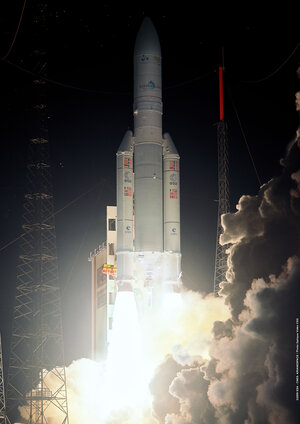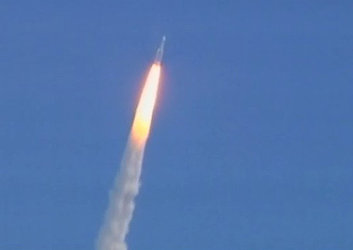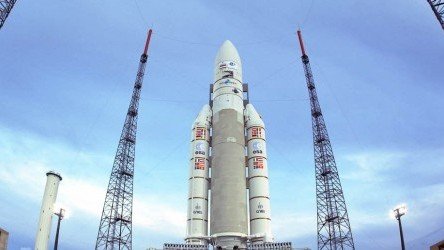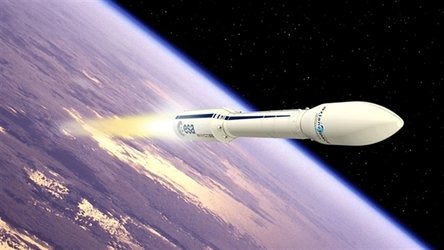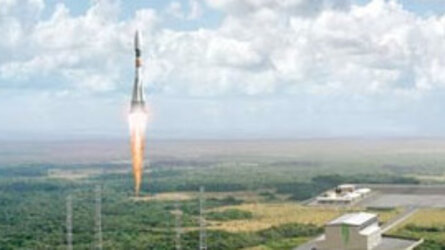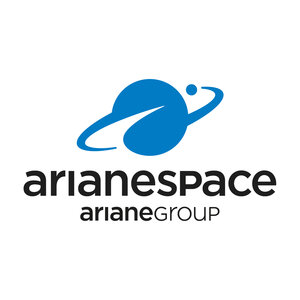Ariane 5’s second launch of 2010
Yesterday evening, an Ariane 5 launcher lifted off from Europe’s Spaceport in French Guiana on its mission to place the Arabsat-5A telecommunications satellite and the multi-mission COMS satellite into their planned transfer orbits.
Liftoff of V195, the 51st Ariane 5 flight, came at 23:41 CEST (21:41 GMT; 18:41 French Guiana). The target orbit had a perigee altitude of 250 km and an apogee altitude of 35 958 km, inclined at 2º to the equator. The satellites were accurately injected into their transfer orbits about 26 minutes and 32 minutes after liftoff, respectively.
Arabsat-5A will be positioned in geostationary orbit above the equator at 30.5°E to provide telecommunications and TV broadcasting services in the Middle East and North Africa in the Ku- and C bands. South Korea’s COMS, to be positioned in geostationary orbit over 128.3°E, carries three payloads dedicated to meteorology, ocean observation and telecommunications.
Satellites in a circular orbit with an altitude of 35 800 km keep pace with Earth’s rotation and appears stationary when observed from the Earth, hence 'geostationary'.
The payload mass for this launch was 8393 kg: the satellite’s totalled 7315 kg, with payload adapters and dispensers making up the additional 1078 kg.
Arianespace and Europe’s Spaceport are planning four more Ariane launches in 2010, maintaining the heavy-lift vehicle’s flight rate. The ability to sustain high launch rates has already been demonstrated: during the 12-month period from August 2007 to August 2008 there were nine launches (V177 – V185).
V195 flight timeline
Ariane 5’s cryogenic, liquid-propellant main engine ignited first. Seven seconds later, the solid-propellant boosters also fired, and the vehicle lifted off a fraction of a second later.
The solid-propellant boosters were jettisoned 2 min 20 sec after main engine ignition, and the fairing protecting the payload during the climb through Earth’s atmosphere was discarded at 3 min 9 sec. The launcher’s main engine shut down at 8 min 55 sec; six seconds later, the main cryogenic stage separated from the upper stage and its payload.
Four seconds after main stage separation, the engine of the cryogenic upper stage was ignited to continue the journey. This engine shut down 24 min 40 sec into the flight, at which point the vehicle was travelling at 9416 m/s (33 898 km/h) at an altitude of 581.8 km – and geostationary transfer orbit had been achieved.
At 26 min 39 sec, Arabsat-5A separated from the upper stage, followed by COMS at 32 min 38 sec. Ariane 5’s flight was formally completed 49 min 52 sec after main engine ignition.















 Germany
Germany
 Austria
Austria
 Belgium
Belgium
 Denmark
Denmark
 Spain
Spain
 Estonia
Estonia
 Finland
Finland
 France
France
 Greece
Greece
 Hungary
Hungary
 Ireland
Ireland
 Italy
Italy
 Luxembourg
Luxembourg
 Norway
Norway
 The Netherlands
The Netherlands
 Poland
Poland
 Portugal
Portugal
 Czechia
Czechia
 Romania
Romania
 United Kingdom
United Kingdom
 Slovenia
Slovenia
 Sweden
Sweden
 Switzerland
Switzerland






























